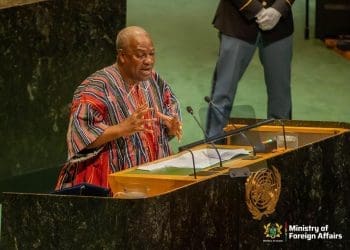The National Communications Authority (NCA) has given MultiChoice Ghana Limited, operators of DStv, a 30-day ultimatum to justify its pricing model or face the suspension of its broadcasting licence.
In a regulatory notice issued under Section 13 of the Electronic Communications Act, 2008 (Act 775), the NCA informed the pay television service provider of its intent to suspend its Subscription Management Service for Satellite Television Broadcasting (Pay TV Direct-to-Home Bouquet) due to what it describes as pricing practices “inimical to the public interest.”
The directive gives MultiChoice until early September 2025 to either explain its position, propose remedial measures, or submit formal objections to avert the impending suspension of its authorisation to operate in Ghana.
Govt-operator row turns public
This regulatory threat is the latest flashpoint in an intensifying public row between MultiChoice Ghana and the Minister for Communications, Digital Technology and Innovation, Sam Nartey George.
At the centre of the dispute is the cost of DStv subscriptions in Ghana, which the Minister argues are exploitative compared to neighbouring countries, particularly Nigeria.
At a press briefing on Friday, August 1, the Minister lambasted DStv for what he called “unjustifiably high prices,” citing discrepancies in the cost of the DStv Premium package across the two countries.
Ghanaian subscribers currently pay the cedi equivalent of about $82.40 per month, while their Nigerian counterparts pay approximately $29 for the same service.
“With the recent appreciation of the cedi, there is no justification for such price disparities. It is unacceptable that Ghanaians should continue to pay almost three times more for the same service being enjoyed by Nigerians,” Mr. George stated.
He subsequently instructed the NCA to act decisively by revoking MultiChoice’s licence if the company failed to reduce prices by August 7, 2025.
MultiChoice pushes back
In a sharply worded rebuttal issued on Sunday, August 3, and signed by Managing Director Alex Okyere, MultiChoice described the Minister’s directive as misguided and out of step with economic realities.
The company insists that its pricing model reflects the macroeconomic pressures it faces in Ghana and cannot be arbitrarily altered without risking service quality and financial sustainability.
“MultiChoice values its subscribers and endeavours at all times to keep DStv subscription fees as low as possible, despite the extremely challenging competitive and macro-economic environment in which we operate,” the company said in a nine-page response to the Ministry.
The broadcaster cited the depreciation of the cedi by over 240% in the past eight years as a major factor affecting pricing, arguing that the recent currency rebound, while positive, is not sufficient to allow for sweeping reductions in subscription fees.
“It is not tenable to reduce the DStv subscription fees in the manner proposed by the Minister,” the statement read. MultiChoice also rejected media reports suggesting it described the cedi’s appreciation as a “fluke,” calling such interpretations false and inflammatory.
Ongoing engagement or public showdown?
Despite the public disagreement, MultiChoice revealed that it has been engaging both the Ministry and the NCA in private, constructive dialogue aimed at resolving the pricing impasse amicably.
The company expressed regret over the Minister’s public posture, stating that it had hoped for continued cooperation behind closed doors.
“It is regrettable that the Minister has taken this stance, notwithstanding our ongoing endeavours to engage with the Honourable Minister candidly and in good faith on this important matter,” the company said.
Nevertheless, MultiChoice reaffirmed its commitment to Ghana and the spirit of dialogue, noting that it has been operating in the country for more than three decades and currently provides employment and business opportunities for hundreds of Ghanaians.
“We are mindful of the dire implications that an impasse may have on you and your livelihoods, and we assure you that we are committed to working together with the Minister and the NCA to resolve this matter,” the statement added.
Regulatory battle looms
With the August 7 deadline now expired and the NCA’s 30-day window in effect, the dispute is morphing into a major test of regulatory strength and the boundaries of market intervention in Ghana’s telecommunications and broadcasting space.
Observers say the government’s demand for price parity across West African markets is grounded in a populist push for consumer protection.
But others caution that heavy-handed regulatory intervention could undermine investor confidence and ignore legitimate business constraints such as inflation, exchange rate volatility, and content licensing costs.
For its part, MultiChoice maintains that it operates within the law and that any resolution must take into account the unique economic conditions of the Ghanaian market.
“MultiChoice remains committed to constructive engagement with the Honourable Minister and to complying with all applicable laws and regulations in Ghana, and trusts that the authorities will do likewise,” the company concluded.
What next?
The coming weeks are expected to be critical in determining the future of DStv’s operations in Ghana.
If the NCA follows through with its threat to suspend MultiChoice’s licence, thousands of Ghanaian subscribers may be cut off from their preferred satellite television service.
Industry stakeholders are watching closely to see whether compromise will prevail—or whether this standoff signals a new era of regulatory assertiveness in Ghana’s digital and media landscape.












